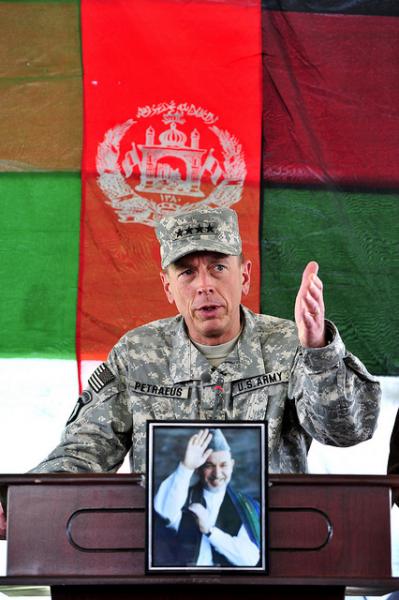After Causing Downfall Of McChrystal, Rolling Stone Journalist Turns His Pen To Successor Petraeus

Hastings writes on the General and his counterinsurgency strategy in Afghanistan:
We are making progress, but that progress is fragile and reversible. We have broken the momentum of the Taliban, but there will still be heavy fighting next year. The troops will start coming home soon, but they won't start coming home soon. We aren't "nation-building," the president says, though we'll stay in Afghanistan past 2014 to build its nation. It was, in the end, a nonreview review, which suited Petraeus just fine, giving him more time to shape the outcome not just in Kabul, but in Washington. As the general had spelled out in his doctoral dissertation, winning the hearts and minds of Congress is what matters most. Or as one U.S. military official puts it, "If anyone can spin their way out of this war, it's Petraeus."
During his time in Iraq, Petraeus earned the nickname King David, for the imperious manner in which he ruled over the ancient city of Mosul. In Afghanistan, a more apt honorific might be the Godfather. To get America out of the war, Petraeus has turned to the network of warlords, drug runners and thieves known as the Afghan government, which the general himself has denounced as a "criminal syndicate." Within weeks of assuming command, Petraeus pushed through an ambitious program to create hundreds of local militias — essentially a neighborhood watch armed with AK-47s. Under Petraeus, the faltering operation has been expanded from 18 districts to more than 60, with plans to ramp it up from 10,000 men to 30,000.
In Afghanistan, however, arming local militias means, by definition, placing guns in the hands of some of the country's most ruthless thugs, who rule their territory with impunity. In the north, Petraeus is relying on Atta Mohammed Noor, a notorious warlord-turned-governor considered to be one of the most powerful men in Afghanistan, to prepare militias for a long fight with the Taliban. Smaller militias in the region — which have been likened to an L.A. "gang" by their own American advisers — are also getting U.S. training. In the east, where violence has significantly increased, efforts to back local strongmen have already resulted in intertribal violence. And in the south, Petraeus has given near-unconditional support to Ahmed Wali Karzai, the president's brother and one of the country's most unsavory gangsters.
Read the full article here.



